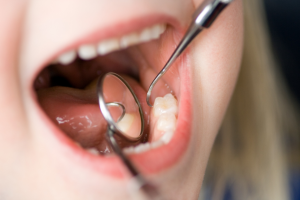Are Fillings Necessary for Baby Teeth?
June 5, 2023
 Your child’s baby teeth are only in place for a few years, but they are influential in their oral health and development. The biggest threat to teeth is tooth decay, despite being preventable. Cavities are common, especially in children. If your child has a cavity, their pediatric dentist will recommend a dental filling. Although the tooth will eventually fall out, not treating it can have lasting consequences for your child’s dental health. Here’s why fillings are necessary, even when it’s a baby tooth.
Your child’s baby teeth are only in place for a few years, but they are influential in their oral health and development. The biggest threat to teeth is tooth decay, despite being preventable. Cavities are common, especially in children. If your child has a cavity, their pediatric dentist will recommend a dental filling. Although the tooth will eventually fall out, not treating it can have lasting consequences for your child’s dental health. Here’s why fillings are necessary, even when it’s a baby tooth.
Facts About Childhood Tooth Decay
Cavities are more common than childhood asthma. Over 50% of children aged 6 to 8 have had at least one in a primary tooth. Various factors can increase a child’s risk of tooth decay, like improper brushing methods, drinking a lot of sugary beverages, or not visiting a dentist regularly.
A tooth-colored filling can treat early stages of decay, which will blend in with their enamel, so no one will know it is there. With no treatment, decay can reach the inner layers of the tooth, causing an infection that will require a root canal to resolve.
Every Baby Tooth is Important
Baby teeth begin to fall out around the age of 6, typically in the order they came in. Every tooth allows your little one to develop the necessary oral function for eating and speaking. Each tooth also acts as a placeholder for a permanent tooth.
If a tooth is lost too soon, it can affect your child’s ability to speak clearly and increase their risk of bite and alignment problems. A dental filling is a simple, minimally invasive solution to preserve your child’s tooth until it’s ready to come out naturally.
Preventing Childhood Tooth Decay
Cavities are common, but you can do many things to lessen your child’s risk, like:
- Good Home Oral Hygiene Habits: Children should brush their teeth at least twice a day for 2 minutes. Introduce daily flossing when they are around the age of 6.
- Regular Dental Care: Dental professionals recommend a child see a dentist before their first birthday and have a cleaning and checkup every 6 months.
- A Nutritious Diet: A diet limited in sugars and starches significantly reduces the occurrence of cavities.
- Fluoride Products and Treatments: Fluoride strengthens enamel naturally. Besides using fluoride toothpaste at home, ask their pediatric dentist about the benefits of fluoride varnish.
- Dental Sealants: Dental sealants provide an added layer of protection to cavity-prone areas, like the back molars.
If your child has a cavity, don’t panic. Their pediatric dentist will use the latest innovations in dentistry to ensure a pain-free appointment when placing a dental filling.
About Dr. Allen Pearson
Dr. Pearson achieved his dental degree from the Creighton University School of Dentistry and has continued his education to focus on pediatrics. He earned his Pediatric Dental Specialty Certificate from the University of Rochester Medical Center and Eastman Dental College. If your little one needs a cleaning and checkup, request an appointment through our website or call (972) 833-8988.
